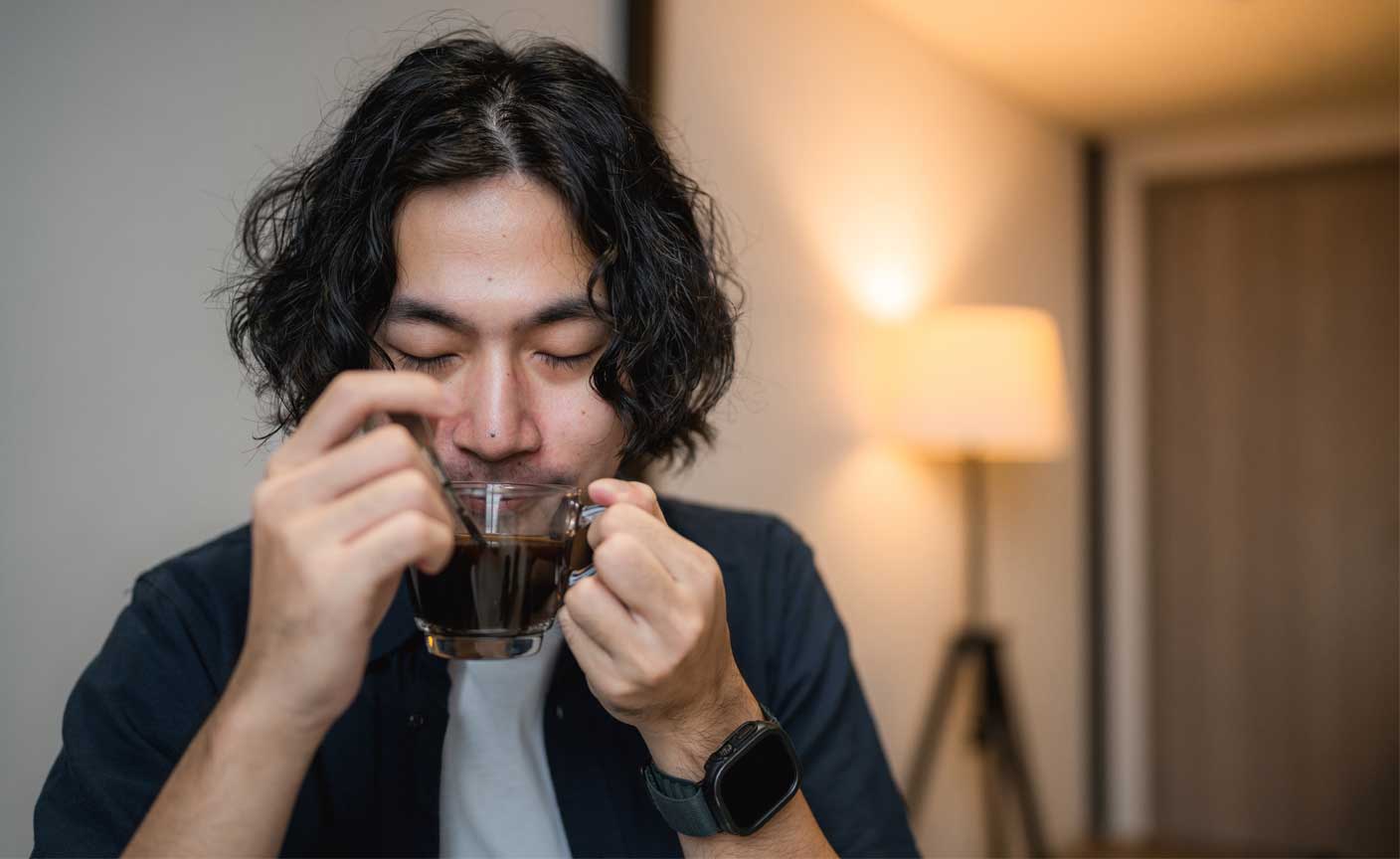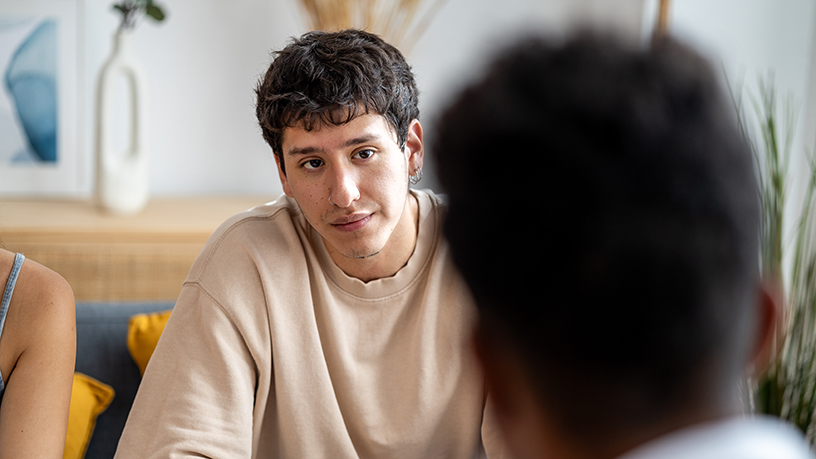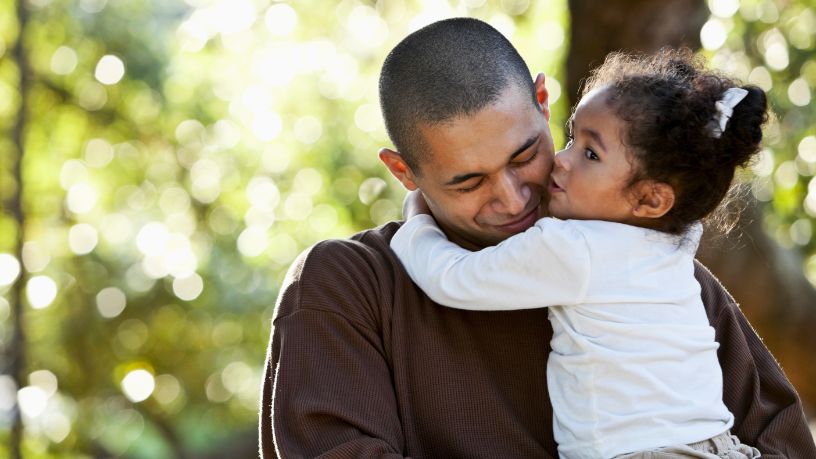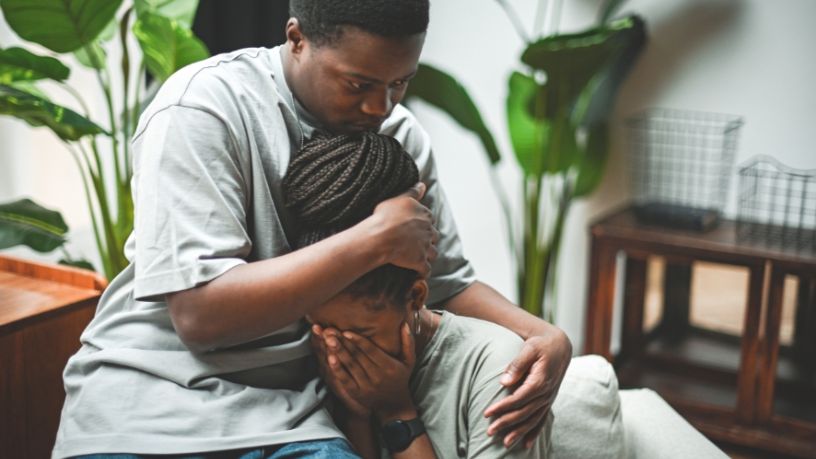On this page
Key takeaways
- Anxiety can hit anytime, knowing how to respond in the moment helps you regain control and stop it spiralling.
- These science-backed strategies may calm your body, slow racing thoughts, and reset your mind in minutes.
- If anxiety keeps coming back or starts affecting daily life, see your GP or a psychologist.
You’re out with friends, gearing up for a big meeting or simply trying to relax after work and suddenly your chest tightens, your mind races, or you feel that familiar wave of panic.
When anxiety hits, here’s what you can do.
1. Hit pause with your breath
Your body’s alarm system is in overdrive, shallow breathing, racing heart, that adrenaline rush.
Slowing it down sends a message: we’re safe now.
Try this: Inhale through your nose for 4 seconds, hold for 2, then exhale slowly for 6 seconds. Repeat for 1-2 minutes.1
Research shows diaphragmatic breathing reduces anxiety symptoms by calming the nervous system.2
2. Ground your senses back to now
When your thoughts are racing about the future “What if…?” or the past “I should’ve…”, try to anchor yourself in the present.
Try this: Use the 5-4-3-2-1 method. Name 5 things you see, 4 you can touch, 3 you hear, 2 you smell, 1 you taste.3
This sensory check interrupts anxiety’s loop and pulls your mind into the moment.
3. Check your thoughts and challenge them
Anxiety loves worst-case scenarios. One of the fastest ways to regain control is to ask: Is this really what’s happening?
Try this: Pause and ask yourself: “What’s the evidence this thought is true?” “What’s most likely to happen?”
These are core techniques from Cognitive Behavioural Therapy (CBT) one of the strongest evidence-based treatments for anxiety.⁴
4. Move your body, even briefly
Physical movement flushes out the built-up stress hormones and releases mood-boosting endorphins.
You don’t need a full workout, just something to break the cycle.
Try this: Stand up, stretch your arms overhead, walk around for 2–3 minutes, or dance to one of your favourite songs.
Even short bursts of movement help reduce anxiety in that moment.5
[Dani Cullen stands on an exercise mat, wearing loose fitting pants and a comfortable top. She's in front of a white wall with a pot plant behind her and two windows on either side of her].
Dani Cullen: Today we'll be sharing a quick qigong routine to help you relax your nervous system, to help you bring you back to your body and to presence.
To help you feel like you are more yourself, to help you basically come home to yourself and to your more natural state of peace and calm.
[Text appears on screen: 'Advice: While qigong is generally considered safe, pregnant individuals should speak to their health care provider before participating in this practice.'].
You will need to just find a nice quiet place, either indoors or my favourite is out of nature.
But just be aware that you can do this practice anywhere, anytime that you feel that you need.
So, let's begin.
Take your feet shoulder width apart, soften the knees and place your hands on your belly.
[Dani adjusts her stance to match her instructions].
And we're just going to begin by just letting go, by taking a big, deep breath in.
[She breathes in].
And just let go of any stress, tension with a big exhalation or a big sigh.
[She exhales and bounces up and down slightly, shaking out her arms].
Nice big breath in, breathing deep down into your belly… and letting go with a big sigh.
[She exhales and repeats the movement].
Breathing in one more breath.
[She breathes in and out].
And start just by feeling your feet, evenly balanced over the floor.
Imagine you're all connected to the Earth.
Feel that connection with Mother Earth.
Just feel for a moment her presence… and breathe deeply into your belly.
[Dani closes her eyes and breathes in and out].
Feel that you are supported and nourished and held by Mother Earth.
Big breath into your belly.
Just letting go the breath through the nose.
[She opens her eyes].
Softening the knees, tilting the tailbone forward, the hips forward and just drawing the pelvis down towards the earth.
[She bends her knees slightly and demonstrates tilting the hips].
Lengthen your spine and tuck your chin in just a little bit towards the neck so the crown is lifting up to the universe.
So we're stretching out, drawing the bottom of the spine down towards the earth and the crown up towards the heavens.
Relax those shoulders.
[She stands with her feet a little more than hip distance apart with her arms relaxed by her sides].
Sink the shoulders down towards the hips, and the hips down towards the knees. Down towards the feet, and then sink the feet down and connect with the earth.
[Dani relaxes her body and sinks slightly in her knees, emphasising the feeling of being connected to the ground. Her arms are held slightly away from her body and her eyes are closed].
Just for a moment, take your awareness up to the infinite space of the universe above you…
Just connecting in with that light and wisdom and intelligence of the universe and feeling yourself standing strong, grounded and balanced like a channel between heaven and earth.
And take a moment just to smile, turn the corners of your mouth up towards the sky…
And just notice just the simple act of smiling, how it relaxes your face and relaxes your body… and sends a warmth to your heart.
And then placing the hands over the belly, we're going to do some Dan Tian breathing.
[She folds her hands gently over her stomach, her eyes still closed].
And Dan Tian is like the, where we store our qi, where we, it's like a reservoir of qi.
So we're going to breathe deeply down into the belly, filling up the belly.
And then on the exhalation, we're going to breathe out through the nose and letting the belly fall back towards the spine.
Just doing a couple more breaths, deep down into the belly, breathing in… and then breathing out, letting the belly fall back towards the spine.
One more breath, breathing in…
Breathing out.
Placing one hand over the heart, continue to breathe down into the belly.
[She keeps one hand on her stomach and moves the other to her chest].
Opening up that belly, and then let the breath continue up past the ribs and right up into the heart space, right up into the top of the chest.
And then let that breath fall back down from the top of the chest, down past the ribs and back to the belly.
[She demonstrates the movement of the breath. Her chest and shoulders move gently up and down as she inhales and exhales].
Imagine the breath is like a wave on the ocean, starting deep down in the belly, starting deep down in the ocean and rolling onto shore, right up into the chest.
And then it retracts back from the shore down through the body, back to the belly.
Breathing in.
[She inhales].
Breathing out.
[She exhales].
As we start to breathe deeper down into the belly, more slowly, gently… we start to come into our parasympathetic nervous system.
We start to relax the nervous system, calm the mind, relax the body.
And then on the last exhalation, take the hands down to the belly and continue to move the hands up the body with the breath.
[Dani brings both hands to her stomach. As she inhales, she gently lifts her hands from her stomach and raises them in line with her body, turning her palms to face the sky once she reaches her face. She stops with her arms above her head, elbows gently bent and palms to the sky].
Lifting up, looking up.
[She holds her arms in the same position].
Holding the breath for a moment, and then just gently letting go through the nose, letting the hands fall back down the midline, back to the belly.
[She brings her arms back down with her hands facing the floor on either side of her face. She stops once they're in line with her stomach, rotating her hands to face the sky again].
Storing the energy in the Dan Tian, breathing in. Shining the palms over the lungs.
[She raises her arms again, following the same motion and pausing when they're above her head].
Looking up, opening the palms to that heavenly qi.
Receiving this beautiful light energy and letting it flow down through the brain, the heart, and back to the body.
[She lowers her arms again, stopping once more at her stomach].
Lifting up, breathing in… smiling…
[She repeats raises her arms in the same way and pauses at the top].
Breathing out.
[She lowers her arms, then continues the exercise].
This is called 'Buddha Holds up the Earth'.
Just like the smiling Buddha.
He's smiling with joy as he receives the heavenly qi… and he allows it to flow and wash through the body… storing it in his big belly.
It's his mana. His qi.
And just allow yourself to find this beautiful rhythm, this beautiful flow.
[Dani continues to move her arms slowly up and down].
It may not be in time with me, just go with your own breath.
Just enjoy the movement, the simple act of breathing and moving slowly and becoming more in flow.
One more.
[She stops moving, holding her hands in front of her stomach with a gentle bend in her elbows and her palms facing up toward her chin].
Holding the hands at the belly and just holding your energy nice and strong, just standing centred and grounded.
Feeling connected with the earth… and the heavens…
And just storing that qi into your lower Dan Tian, into your belly.
Breathing in… through the body.
Stepping the legs in, 'Bamboo in the Wind', feet together.
[She holds her hands on top on one another on her stomach and brings her feet together].
And then taking one arm out to the side, lifting up, connecting the fingertips up to the heavens and pressing down with the feet to the earth and just aligning the energies.
[She leaves one hand on her stomach. The other one gently circles out to the side of her body and comes to a stop above her head. She lifts through her body and shoulders to stretch toward the sky. After pausing a moment, she brings her hand back down to rest on her stomach].
Up opposite hand. Coming back to centre, aligning the xin, the mind; qi, the heart; and jing, the lower Dan Tian in the body.
[She repeats the same movement with her other arm].
And again.
[She continues to repeat the movement, alternating arms].
Imagine calling all parts of yourself back to yourself, back to this present moment… and finding that balance.
This time, connect with the universe, bring that light down through the mind and connect in at the heart.
Just keeping the hand at the heart.
[While lowering her arm, she pauses it at her chest. Her elbow is bent to bring her hand to the centre of her chest, and her palm is side-on, facing toward her other arm].
I'm just doing a few deep breaths.
Imagine your mind is dropping down like a pebble in a still pond, and it's dropping down, connecting with the heart… and dropping into the bottom hand at your belly.
[She turns the hand on her stomach so that it's cupped and facing the sky in front of her belly].
Dropping down into that well of peace and stillness within you…
Deep in your being.
And then letting the hand float back down to the belly, and doing that with the opposite arm.
[She switches the position of her hands, bring one down in front of her stomach and circling the other out and over her head until it is in front of her chest with the palm facing to the side].
Lifting up, connecting, drawing down.
Connecting with your heart, breathing into your heart…
Allowing your mind to drop down through the heart like a pebble in a pond.
And falling into that depth of stillness in your being.
That well of peace that you can tap into in any moment.
And then bringing the hands down storing that qi into the lower Dan Tian, into this energy reservoir.
[Dani brings her arm down and folds both of her hands onto her stomach].
And just feeling your body now.
Noticing how your body feels, your mind...
Connecting with that peace and that stillness. Smiling.
Bringing that warmth into your heart… allowing it to radiate and flow harmoniously through your whole entire being.
And this is a great time, you can stay here for as long as you need to.
You may like to lie down and rest and let your body rest.
Thanks for sharing and I'll see you next time.
[Text appears on screen: 'Great work! See you soon.']
5. Reach out or stay connected
When you’re anxious, it’s natural to withdraw, but connection helps switch your brain from alarm mode to social-soothing mode.
Try this: Send a quick text to a trusted friend like: “Hey, feeling a bit anxious, can we talk in 5?” Or call your GP and mention you’ve had recurring anxiety episodes, you may be eligible for a Medicare-subsidised mental health care plan.
Social support often triggers calmer responses in the brain and helps you feel less isolated.6
Bonus quick-hit hack
When to seek help
If you find yourself avoiding life, experiencing anxiety most days, or if it’s interfering with your relationships, work or sleep, it’s important to talk to your GP.
If you have health insurance, you may be eligible for professional support.


At Bupa, trust is everything
Our health and wellbeing information is regularly reviewed and maintained by a team of healthcare experts, to ensure its relevancy and accuracy. Everyone's health journey is unique and health outcomes vary from person to person.
This content is not a replacement for personalised and specific medical, healthcare, or other professional advice. If you have concerns about your health, see your doctor or other health professional.
1 Better Health Channel. (n.d.). Relaxation techniques. Victorian Government.
2 Mayo Clinic Press. (2025). How to reduce anxiety without medication.
3 Verywell Mind. (2024). The 5-4-3-2-1 grounding technique.
4 Better Health Channel. (n.d.). Cognitive Behaviour Therapy (CBT).
5 Verywell Mind. (2025). 9 things to do if you feel anxious right now.
6 YourTango. (2025). Anxiety hacks experts use on themselves.
7 Verywell Health. (2024). Feeling stressed? This cool trick can instantly calm you down.
You might also like
Anxiety Disorders: Everything you need to know
Anxiety disorders can be crippling. Here’s what you need to know about coping with them.
What's the difference between anxiety and depression?
Anxiety and depression are common mental health conditions in Australia. Learn about the different signs and symptoms and where to get help.
Depression: Knowing the signs and finding help
Depression can look different for everyone. We spoke to a psychologist to find out how to recognise the symptoms of depression and where to get help.
A step-by-step guide to managing panic attacks
Panic attacks can happen at any time. Discover practical calming techniques and breathing exercises to manage a panic attack and ease your symptoms.





